Semalt: SEO vs PPC vs SMM
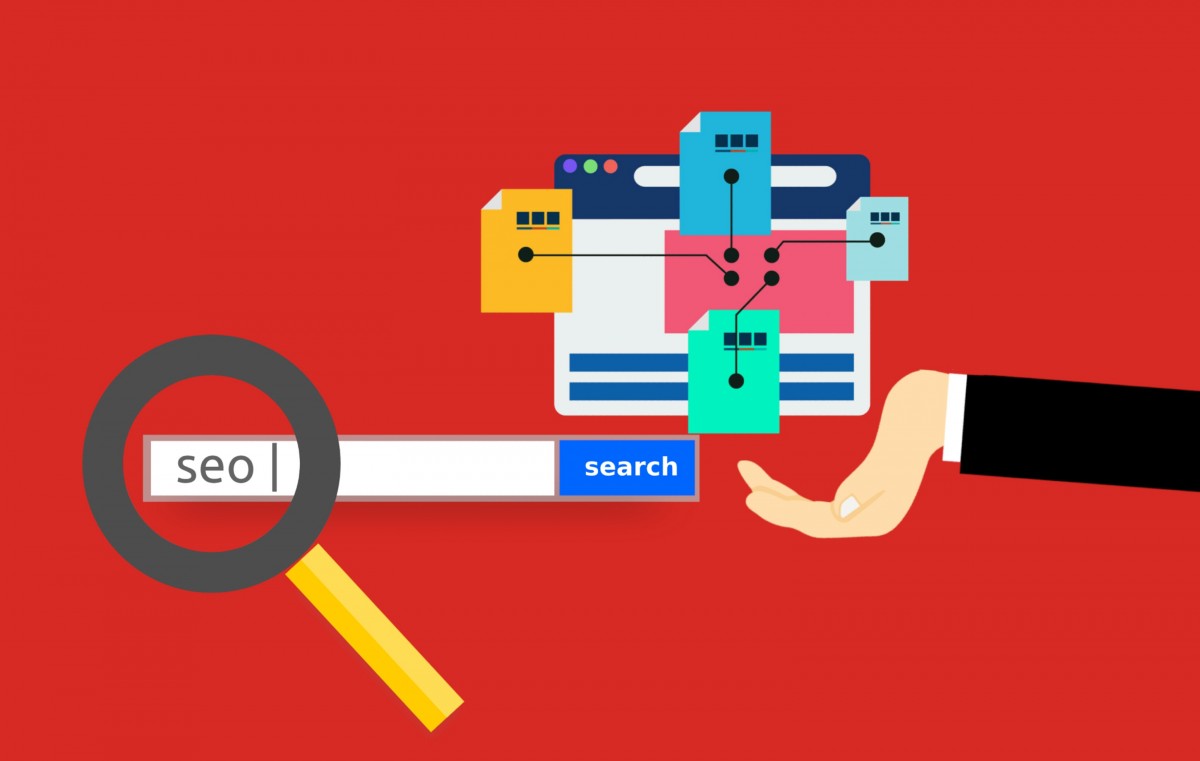
Table of Contents
- Understanding SEO, PPC, and SMM
- SEO vs PPC vs SMM: At A Glance
- Things to Consider
- Semalt Explains What's Right - SEO, PPC, or SMM?
The battle for acquiring the first rank on SERPs (Search Engine Result Pages) is intensifying with every passing day. No matter how tech-savvy a person or organization is, improving the ranking on search engines is challenging than ever.
Digital Marketing Companies/ Webmasters/ and everyone associated with the promotion of websites frequently come up with new and feasible strategies to gain the attention of their target audience.
Despite this, everyone does not get the desired results. People often complain that some Digital Marketing strategies working for their competitors do not work for them.
Well, Semalt has found why this happens. The primary reason behind it is implementing the strategies without considering the client's objectives. A plan or approach bringing results for your competitor may or may not bring you the same kind of success.
Another crucial reason is not having a proper understanding of SEO, PPC, SMM, and other Digital Marketing approaches. To help you understand them better, below is the detailed comparison of the top 3 Digital Marketing approaches.
Understanding SEO, PPC, and SMM
SEO, PPC, and SMM are the acronyms for Search Engine Optimization, Pay-Per-Click, and Social Media Marketing. These are also the terms best known for driving online traffic and money. So, let's understand them one by one.
- SEO (Search Engine Optimization)SEO is the first term that comes to mind when the goal is to rank a website at the top or, at least, on the first page of search results. SEO is the approach to improve a website's search engine ranking, increase its visibility, and drive more traffic towards it.
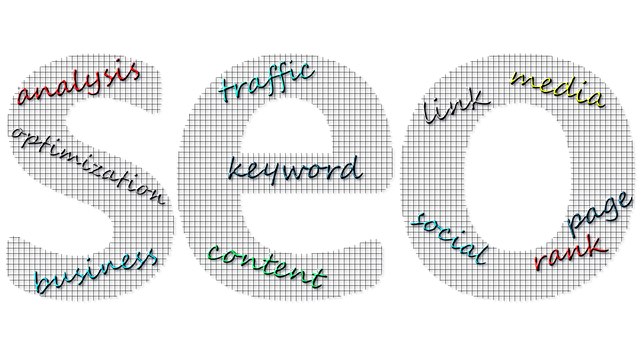 SEO involves a lot of things such as optimization of webpages, the addition of keywords in various fields, increasing its loading speed on different devices, and much more.It implies an SEO-optimized website is always at an advantage compared to the one not optimized as per the latest SEO techniques.
SEO involves a lot of things such as optimization of webpages, the addition of keywords in various fields, increasing its loading speed on different devices, and much more.It implies an SEO-optimized website is always at an advantage compared to the one not optimized as per the latest SEO techniques.SEO Techniques commonly used for optimizing a website are:
- On-Page SEO
On-Page SEO is the first technique you follow while optimizing your website for a better position in SERPs. It involves the strategic placement of keywords on Webpages, Title Tags, Meta Tags, Meta Description, Alt Text, and other places.- Off-Page SEO
This optimization technique involves getting backlinks from other websites. Off-page SEO is a bit tricky and requires experience. For successful implementation of this technique, it is crucial to get backlinks from relevant and highly-ranked websites.- White Hat SEO
This technique involves ethical ways to improve the ranking of a website. The optimization takes place in harmony with the latest rules and regulations set by search engines.The main focus under this SEO technique is on enhancing the user experience, making website responsive, removing unnecessary ads, and increasing the website's speed. These techniques bring slow but feasible results that last long.- Black Hat SEO
You might have got an idea from the name that it involves unethical ways to help a website rank higher. Most search engines and experts do not appreciate these techniques because they are not in alignment with the rules and regulations set by search engines.The websites optimized using Black Hat SEO techniques not only provide inferior user experience but also display the content improperly. These techniques may bring quick results but attracts penalties or ban from search engines after some time. PPC (Pay-Per-Click)
PPC or Pay-Per-Click is a method of online advertising where advertisers are accountable to pay for every click made on their online advertisements.PPC ads have different forms, but the most common ones are the paid ads in search results or SEM (Search Engine Marketing). These advertisements appear when people take the help of search engines to search for something.PPC allows advertisers to display targeted ads exactly when users search for information, products, or services on a search engine.For example, when someone initiates a search "trimmer for men" in Google, the first four results are PPC ads.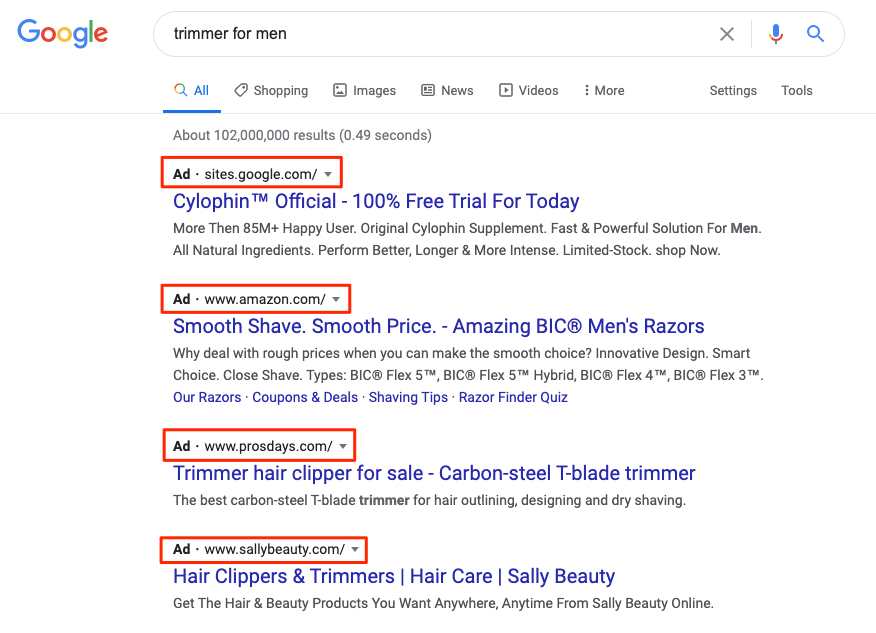 PPC gives results as you expect from SEO. The main difference between the two is that in PPC, you have to pay for appearing at the top of search results, whereas it is not the case with SEO.
PPC gives results as you expect from SEO. The main difference between the two is that in PPC, you have to pay for appearing at the top of search results, whereas it is not the case with SEO.Advantages of PPC
Out of the many advantages of PPC, advertisers find the following most attractive:- In this form of advertising, advertisers need to pay only when someone clicks on their ads, not beyond that. That's why most businesses prefer PPC over other types of advertising.
- PPC brings instant results. It means an advertiser doesn't need to wait for weeks or days to appear on the top of search results.
- As PPC improves the ranking of a website, its visibility increases and, it attracts more traffic.
- A PPC ad campaign gives advertisers more control. If you are running a Pay-Per-Click ad campaign for your website, you can customize ads according to your budget, geographic location, and time of the day.
Note: You need to be careful with PPC. Consider its short-term as well as long-term impacts, else, you may not get optimum results once the PPC campaign ends.SMM (Social Media Marketing)
SMM is a method to promote websites via social media channels such as Twitter, Facebook, and LinkedIn, amongst others. Advertisers are at an advantage with SMM because they can easily target social media users, which are huge in numbers.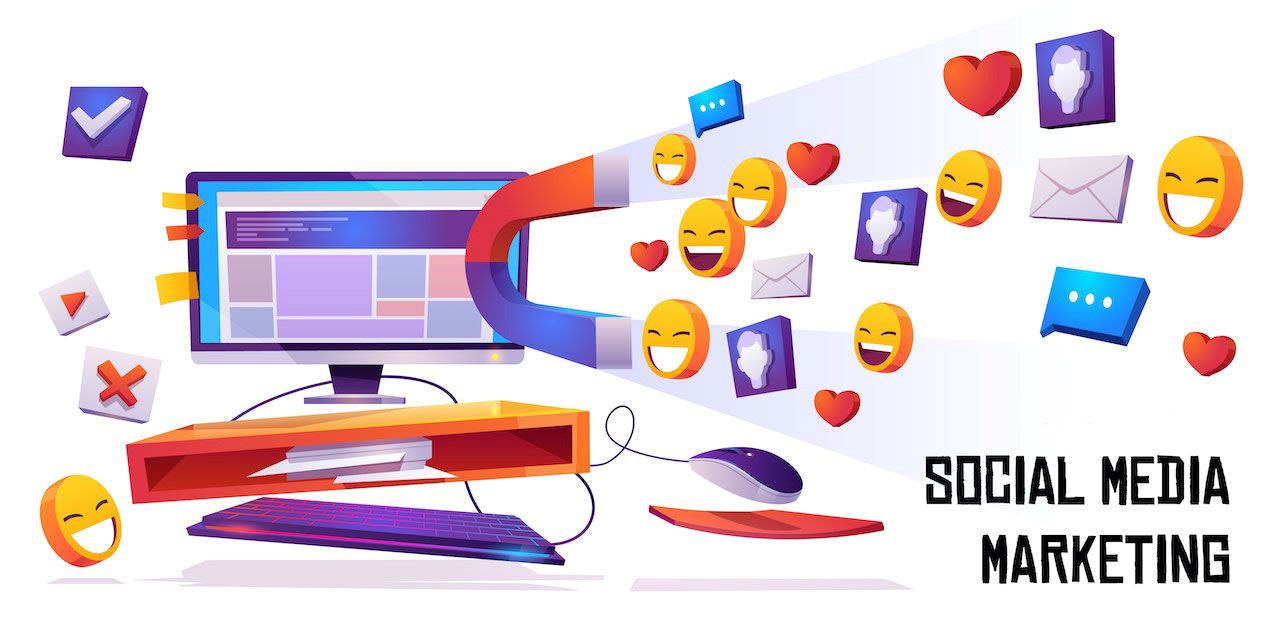 Today, more and more advertisers are looking towards social media channels because it is the place where consumers of the present time engage with each other the most. Not only this, many experts believe that the future of Digital Marketing is Social Media.Paid Social Media Marketing is more effective and brings more results. Advertising done through SMM is much like PPC. Many factors are similar, such as:
Today, more and more advertisers are looking towards social media channels because it is the place where consumers of the present time engage with each other the most. Not only this, many experts believe that the future of Digital Marketing is Social Media.Paid Social Media Marketing is more effective and brings more results. Advertising done through SMM is much like PPC. Many factors are similar, such as:- Both PPC and SMM adds the behavioural tendency of users in search equations.
- In both SMM and PPC, advertisers need to pay only when someone clicks on their ads.
- An advertiser gets immediate results (more visibility, increased traffic, higher conversion, and others) through SMM as well as PPC.
Along with the positives, the negatives of SMM and PPC are also similar. Yes, the pleasant results might disappear when your paid SMM campaign ends.In recent times SMM campaigns have become immensely popular because the results they bring are quick, effective, and as per the expectations of advertisers.
SEO vs PPC vs SMM: At A Glance
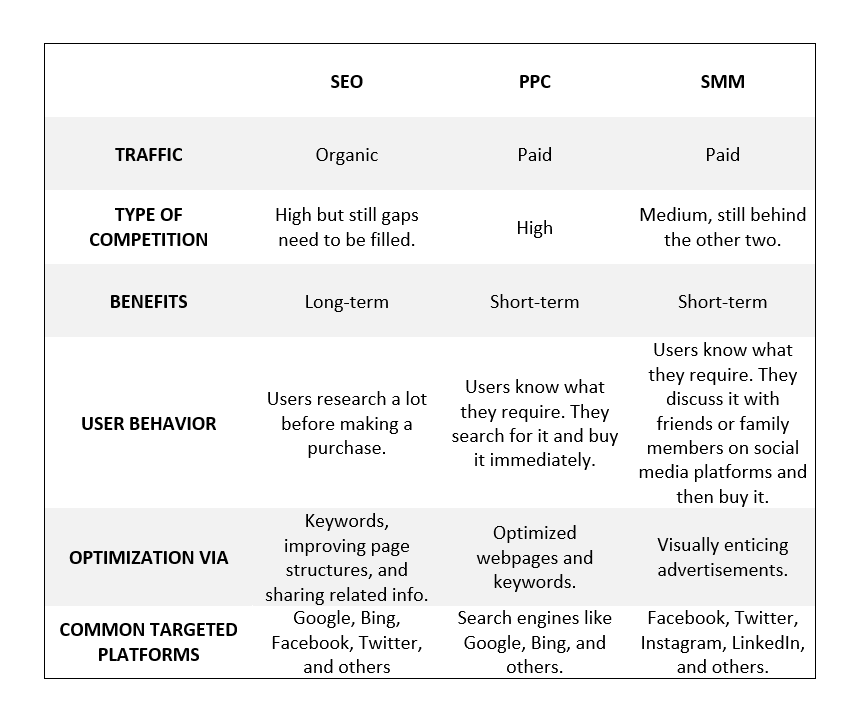
Things to Consider
Experts from Semalt explains that before opting for an organic or paid method to rank your website higher, you should consider the following things:
- Budget
The very first thing you should consider is your budget, how much you can spend on improving your site's visibility, traffic, and other things.
If you are running a small or medium-sized business, you should not invest in pointless techniques that bring no results. Also, you should not waste money on techniques you don't understand.
If you run a large business with a huge advertising budget, you can experiment with new and lucrative techniques.
- Duration
After finalizing your budget, you should decide the duration for which you want these services. As organic approaches take time to bring results, these services are hired for a long duration.
On the other hand, paid services bring immediate results. One thing you should always remember with paid approaches that the results can vanish as quickly as they appear in the beginning.
- Short-term or Long-term Results
Find out whether you want short-term or long-term results. If you are a newbie and knows the outcomes of organic as well as paid approaches, then you should increase your site's visibility and traffic by betting on paid methods like PPC or SEM.
If you want long-term and stable results, you can go for SEO techniques like the strategic placement of keywords, enhancing user experience, increasing the site's load speed, and others.
- Analyze Your Competitors
To finalize the technique, you can also research and analyze your competitor's approach. There is nothing wrong with doing so.
You will get an insight into your competitors' spendings, keywords, and approaches. By doing so, you'll get a direction for channelling your budget and end up with an efficient promotional technique without hurting your pockets.
- Semalt Explains What's Right - SEO, PPC, or SMM?
Semalt experts have a simple answer to this - all three approaches are right. When you are doing business, you'll require both quick and long-lasting results.
It is possible when you go for paid approaches, like PPC and SMM, first and then organic ones like SEO. If you leave the Black Hat SEO techniques, all are essential to get a higher rank, increased traffic, and more profits.
Now that you know both organic (SEO) and paid (PPC and SMM) approaches are essential, the next you should do is find a way to use them efficiently.
Most website owners find it challenging to blend the paid as well as organic techniques and come up with an achievable strategy. So, it is best to hire the services of an industry expert, like Semalt, that has years of experience and highly-qualified workforce to promote any website in the best possible way.